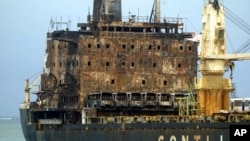Piracy off the coast of Somalia has cost many lives and billions of dollars lost through ransom demands and stolen cargo. However, a report out Friday by the London-based think tank Chatham House has calculated that it has also brought widespread economic development to the poor, war-torn country. Normal state infrastructure that exists in other countries has fallen apart in Somalia, but the report says pirates have stepped into the void, providing "local governance and stability."
According to this report, the average ransom being paid to pirates who operate on the coast of Somalia is $4.5 million. The report’s author, Anja Shortland of Brunel University just outside London, wanted to find out where the money is going. Somalia is one of the most violent societies on earth and difficult for foreigners to visit. So she had few sources of information available to her.
First she looked at data given to her by local sources in the country. That told her that a significant proportion of ransom money makes its way into the local community. About a third of the dollars get exchanged into the local currency - the shilling - she says, evidence that it ends up being used by the poorest in society. She says this doesn’t necessarily mean the pirates are generous, just pragmatic.
"Somalia has a really strong culture of sharing - so if anyone comes into money then it is expected that the family will benefit as well," she said. "There is a lovely Somali saying - if you have a hundred goats and your cousin has none, then you are a poor man. Sharing is a form of insurance - it'd be a very poor choice to keep your entire wealth about your person, because the chances are that in our drought your livelihood will be wiped out. So sharing with your family means that if something bad happens to you, you can get back to your family and they will support. That culture is very much alive.”
Shortland then looked at two other sources of information - aerial photos of nighttime over Somalia and high resolution satellite images during the day. Both told her that some inland communities had got a lot richer, even when most other communities had become poorer over the past four years. There were more lights on at night now in some inland towns, and more construction projects than there were before.
Shortland explains why inland communities fare better than coastal ones, despite the piracy happening at sea.
"A traditional pirate crew would be five, six militia men from inland and one or two fishermen that know about navigating," she said. "So probably most of the people come from inland anyway. Somalia is a pastoral culture - not really a fishing culture. It’s not glamorous to be a fisherman."
Piracy is providing livelihoods to thousands of other people - cooks, traders, pastors, fishermen - her report concludes, not just the pirates themselves. But that doesn’t mean she thinks a society based on piracy is better than other alternatives.
“I am not arguing that we should accept piracy as a form of development," said Shortland. "What I am arguing here is, if we were to stop piracy by military means, we need to think about the poor people who are currently benefiting from piracy. The developmental effect of piracy is strong enough to make it important for us to consider how we are going to replace those incomes."
Western countries are increasing aid commitments to Somalia - even as budgets for other areas of policy are cut back. If the Chatham House report is correct, the financial incentives for the Somali population to wean themselves off piracy will be need to be large.




